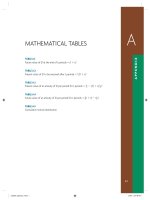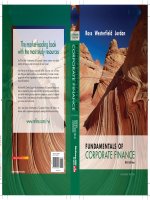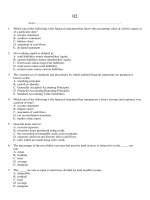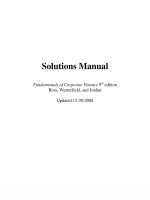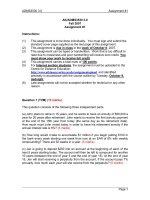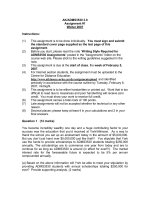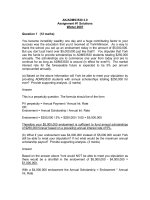exam solution 2 fundamentals of corporate finance, 4th edition brealey
Bạn đang xem bản rút gọn của tài liệu. Xem và tải ngay bản đầy đủ của tài liệu tại đây (27.06 KB, 9 trang )
Name
Section
ID #
Professor Alagurajah’s Section A (Fridays, 2.30-5.30 pm), Professor King’s Section G
(Internet), Professor Kohen’s Section F (Tuesdays, 2:30-5:30 pm), Professor Li’s Section E
(Wednesdays, 2:30-5:30 pm), Professor Okonkwo’s Section B (Tuesdays, 7-10 pm),
Professor Patterson’s Section D (Thursdays, 4-7 pm), and Professor Tahani’s Section C
(Wednesdays, 7-10 pm).
AP/ADMS 3530.03 Finance Midterm Exam
Fall 2009
October 25, 2009
Exam – Type A
This exam consists of 30 multiple choice questions and carries a total of 100 points.
Choose the response which best answers each question. Circle your answer below, and
fill in your answers on the bubble sheet. Only the bubble sheet is used to determine
your exam score. Please do not forget to write your name and ID # both at the top of this
cover page and on the bubble sheet. Also please write the type of your exam (A or B) on
the bubble sheet.
Please note the following points:
1) Read the questions carefully and use your time efficiently.
2) Choose the answers that are closest to yours, because of possible
rounding.
3) Keep at least 4 decimal places in your calculations and final answers,
and at least 6 decimal places for interest rates.
4) The 20 “Numerical questions” are worth 4 points each.
5) The 10 “Conceptual questions” are worth 2 points each.
6) Unless otherwise stated, interest rates are annual, and bonds pay
semiannual coupons and have a face value (or par value) of $1,000.
7) You may use the back of the exam paper as your scrap paper.
1
Numerical questions (4 points each)
1. Your cousin just came home from a poker tournament in Las Vegas and is now trying to
pay off a gambling debt of $5,000. You have agreed to pay off the debt for him today,
and in return he has agreed to pay you $250 per month over the next two years with
payments beginning immediately. What is the effective annual interest rate you are
charging him?
A) 19.75%
B) 19.86%
C) 21.77%
D) 22.26%
E) 23.45%
2. Your parents are willing to pay for your MBA degree and want to put aside funds today
even though you will not be entering MBA school for another 3 years (from today). If
they can earn 4.5% annually on the funds and your MBA school will cost $35,000 at the
beginning of each year of the two year program, how much money do they need to set
aside today?
A) $57,435
B) $60,020
C) $65,653
D) $67,243
E) $70,186
3. You have inherited funds from your grandmother’s estate and want to buy a property in
Florida which costs $250,000. You have enough funds for a 30% down payment and
you can obtain a mortgage for the balance at a five-year, fixed rate of 5.5% (APR
compounded semiannually). How much will you still owe at the end of five years
assuming a 20-year amortization period?
A) $147,172
B) $152,665
C) $195,625
D) $210,246
E) $224,825
4. You have decided to buy your first house and you have been approved for a $300,000
home mortgage. The posted rate is 5.60% (APR, compounded semiannually) and you
have decided to make weekly payments. If the amortization period is 25 years and rates
do not change, how much will you pay in interest over the life of the mortgage? (assume
52 weeks in one year)
2
A) $127,895
B) $253,618
C) $387,555
D) $553,618
E) $576,016
5. An Atkinson student who borrowed $7,560 has agreed to pay back the loan with
monthly payments of $150. If the interest rate is stated as 10% APR monthly
compounded, how long will it take to pay back the loan?
A) 38.19 months
B) 45.57 months
C) 50.40 months
D) 65.64 months
E) 67.89 months
6. Which account would be preferred by a depositor: a 7.20% APR with weekly
compounding or a 7.25% APR with quarterly compounding?
A) 7.20% with weekly compounding
B) 7.25% with quarterly compounding
C) The depositor would be indifferent
D) The time period must be known in order to select the preferred account
E) None of the above
7. You decide to sell your car and a friend has offered you $1,000 now and four annual
payments of $1,800, with the annual payments starting at the end of the second year.
Your other option is to sell the car to a dealer today for $6,450. Assuming your friend
will not default on the payments and the market annual interest rate is 8%, should you
sell your car to your friend?
A)
B)
C)
D)
E)
Yes; present value of the friend’s offer is $6,520
Yes; present value of the friend’s offer is $6,624
No; present value of the friend’s offer is $5,134
No; present value of the friend’s offer is $5,624
Both options offer the same value
8. In order to purchase a laptop at $2,450, you agree to make the following payments:
$500 today, $650 in one year, X in two years, and $800 in three years. The annual
interest rate is 6%. What is X?
A) $500.00
B) $612.50
3
C) $665.10
D) $747.30
E) $851.34
9. How much interest is to be paid in the second year of a 6-year loan of $100,000 with
payments occurring at the end of each month, and a 6% annual interest rate
compounded monthly?
A) $1,389
B) $1,657
C) $4,731
D) $6,000
E) $9,887
10. Today, one year before your retirement, you forecast that your annual withdrawals will
decline at a rate of 4% per year for 25 years; with the first withdrawal of $75,000 made
one year from now. If you earn an annual interest rate of 4%, how much money should
you have in your bank account today?
A) $773,547
B) $810,759
C) $937,500
D) $1,171,656
E) Undefined
11. Potential investors of XYZ Corp. stock are looking for a 20% expected return. XYZ
currently trades at $15 per share and has just paid an annual dividend of $2 per share.
Based on the above what is the implied growth rate in dividends for XYZ Corp.?
A) 5.00%
B) 5.88%
C) 6.25%
D) 6.67%
E) 7.14%
12. In a recent period Joshua Inc. reported earnings per share (EPS) of $4 and following its
policy just paid a dividend based on a payout ratio of 50%. The company’s share price
and dividends have grown at an average of 5% per year, and there is no reason to
expect that this will change in the future. You want to buy Joshua stock and have
determined that the market expected return for this type of stocks is 16%. If Joshua
stock was trading at $18.45 on the market, you would likely
A) not buy the stock because the fair value is $ 17.27
4
B)
C)
D)
E)
not buy the stock because the fair value is $18.18
buy the stock because the fair value is $19.09
buy the stock because the fair value is $36.36
buy the stock because the fair value is $66.67
13. ABC Corp. expects its earnings and dividends to grow at 18% over the next 2 years and
15% in the 3rd year and then at a constant rate of 6% thereafter. ABC’s last dividend
was $1.15 and the required rate of return on similar equity is 12%. Based on the above
what should be the share price of ABC today?
A)
B)
C)
D)
E)
$22.62
$26.95
$29.63
$32.53
$50.78
14. How much would you pay today for a stock that offers a constant growth rate of 8% for
dividends and has an expected rate of return of 12%? You also know that the stock
should be valued at $40 one year from now?
A) $35.71
B) $37.04
C) $43.20
D) $44.80
E) $45.96
15. Julia Inc. stock currently sells for $84 per share. The market requires a 13% return on
the firm’s stock. If the company maintains a 6% growth rate in dividends, what was the
most recent annual dividend?
A) $5.04
B) $5.55
C) $5.88
D) $6.76
E) $10.92
16. How much should you pay for a $1,000-face value bond with 6% coupon, semi-annual
payments, and 7 years to maturity if the annual interest rate applicable to bonds of
same quality and maturity is 4%?
A) $887
B) $888
C) $1,000
5
D) $1,120
E) $1,121
17. BH Corp. has bonds on the market with $1,000 par value, 14.5 years to maturity, a YTM
of 9%, and a current price of $850. The bonds make semi-annual coupon payments.
What is the coupon rate on BH Corp. Bonds?
A) 3.56%
B) 4.50%
C) 5.50%
D) 7.13%
E) 9.00%
18. BDJ Inc. wants to issue new 10-year bonds. The company currently has 8% coupon,
$1,000 face value bonds on the market that sell for $1,095, make semi-annual coupon
payments and mature in 10 years. What coupon rate should the company set on its new
bonds if it wants to sell them at par today?
A) 2.89%
B) 3.34%
C) 5.78%
D) 6.68%
E) 6.79%
19. KLY Inc. existing bonds have the following terms: 8% coupon, $1,000 face value and
they mature in 12 years. The discount rate reflective of the default risk and maturity is
14%. KLY Inc. is offering the bondholders the option to swap their existing bonds into 3year zero-coupon bonds with a face value of $1,000. Assuming KLY Inc. will not default
during the next 12 years, should existing bondholders accept the option?
A) Yes, because the zero coupon bonds have a shorter 3 year maturity.
B) Yes, because, the zero coupon bonds are worth more.
C) Yes, because the zero coupon bonds are less sensitive to interest rate risk.
D) No, because the existing bonds are worth more.
E) No, because zero coupon bonds do not pay interest.
20. LMN Co. has 12% coupon $1,000 par value bonds making annual coupon payments
with a YTM of 9%. The current yield on these bonds is 9.80%. How many years do
these bonds have left until they mature?
A) 9 years
B) 10 years
C) 13 years
6
D) 14 years
E) 15 years
Conceptual questions (2 points each)
21. Which of the following is incorrect about partnerships:
A)
B)
C)
D)
E)
Partners have unlimited liability for themselves and their partners.
Partnerships are easy to start.
Partners are subject to double taxation.
Partnerships are flow-through entities.
All of the above statements are correct.
22. The person most directly responsible for looking after the firm’s cash, raising new
capital and maintaining relationships with banks and other investors who hold the firm’s
securities is the:
A) Controller
B) Chief Financial Officer
C) Treasurer
D) Chief Executive Officer
E) Accounts Payable Clerk
23. Given a future value (greater than zero), which of the following will contribute to a lower
present value?
A)
B)
C)
D)
E)
More frequent discounting
Lower discount rate
Less time periods
Both B and C are correct
None of the above statements are correct.
24. An infinite stream of cash flows growing at a constant rate is called a:
A)
B)
C)
D)
E)
Perpetuity
Growing perpetuity
Annuity
Growing annuity
None of the above.
7
25. Which of the following statements about time value of money are true?
A) Nominal and effective rates are the same for annual compounding only.
B) All else being the same: converting an annuity to an annuity due decreases the
present value.
C) For a given dollar amount, the higher the discount rate, the higher the present
value.
D) All of the above statements are correct.
E) None of the above statements are correct.
26. An investor who purchases stock in a firm cannot realize a positive return on that
investment if the firm pays no dividends. This statement is:
A) False: The investor will still receive interest payments from the investment.
B) True: The investor does not receive any cash flows therefore, the investment
return is zero
C) False: The investor may realize a capital gain from the appreciation of the stock
price
D) True: The dividend yield is zero
E) None of the above
27. Which of the following terms is typically associated with both preferred stock and
common stock?
A) Dividend yield.
B) Voting rights.
C) Proxy.
D) Cumulative voting.
E) All of the above.
28. Which of the following is the most correct for an A-rated bond, compared to a BBBrated bond?
A)
B)
C)
D)
E)
The A bond will sell for a lower price.
The A bond will sell for a higher price.
The A bond will offer a higher yield to maturity.
The A bond will offer a lower yield to maturity.
The A bond has a higher credit spread.
29. A callable bond is a bond that:
A) Can provide protection against inflation
B) Can be converted into shares of stock of the issuing company
8
C) Can be repurchased by the issuer prior to its maturity
D) Can be sold at its nominal value
E) Can be extended at the maturity date
30. The maximum number of shares that a company is permitted to issue, as specified in
the firm’s articles of incorporation is called:
A)
B)
C)
D)
E)
Authorized share capital
Issued share capital
Issued and outstanding share capital
Additional paid-in capital
Firm’s capital
9
